ESG Topics A-Z
Palm oil

To PepsiCo:
A steady, sustainable supply of crops is central to our business. While PepsiCo is one of the largest global buyers of palm oil in the consumer products industry, our purchases in 2023 represented less than 1% of the global supply. Palm oil has a long and complex supply chain, with farmers operating in challenging conditions. While this crop provides many benefits to consumers, growers and local communities, palm oil production can have social and environmental challenges.
To the World:
Sustainable agricultural practices are also critical to meeting the increasing demand for food as the global population grows. Transforming how the world grows food is an essential part of building a more sustainable food system. We strive to drive progress within our own palm oil supply chain and collaborate toward more sustainable agricultural standards and practices around the world.
Approach
We use palm oil in our snack food manufacturing due to its wide availability and shelf stability, primarily in Asia, Latin America and other markets where it is grown relatively close to our production facilities. In the United States, however, we rely on other edible oil crops that are widely grown in North America and use very little palm oil.
Positive Agriculture is one of the key pillars of our pep+ (PepsiCo Positive) ambition, aiming to spread adoption of regenerative agriculture practices across our crop and ingredient supply chains — including palm oil. We aspire to source crops and ingredients in a way that promotes sustainable agriculture and strengthens farming communities. To support these aims for palm oil, our sustainable agriculture team is guided by an overarching strategy and a series of objectives.
Objectives
Our ambitions on palm oil center on four key objectives:
- Source sustainable palm oil: Continue to sustainably source 100% of our palm oil through Roundtable on Sustainable Palm Oil (RSPO) in our own supply chain.1 This is a goal we set — and achieved — in 2020, and we remain focused on continuing to achieve it going forward.
- Drive sector transformation towards 100% No Deforestation, No Peat, No Exploitation (NDPE):
- In our own supply chain: Direct suppliers are expected to measure, manage and report progress towards NDPE across their own supply base.
- Across our industry: Collaborate with industry peers, trade associations, government agencies, NGOs and other critical stakeholders to spread adoption of the NDPE implementation principles.
- In our own supply chain: Direct suppliers are expected to measure, manage and report progress towards NDPE across their own supply base.
- Support thriving communities and ecosystems: Work, where possible, to help address systemic issues facing communities and ecosystems in priority palm oil sourcing landscapes, including deforestation, land and workers’ rights and economic viability. Globally, we are aiming to:
- Conserve or restore at least 140,000 hectares (ha) of natural ecosystems in palm oil-producing landscapes by the end of 2025; and
- Support implementation of sustainable agriculture practices that enable farmers to increase production on existing oil palm plantations and minimize impacts on the surrounding area.
- Conserve or restore at least 140,000 hectares (ha) of natural ecosystems in palm oil-producing landscapes by the end of 2025; and
- Promote transparency and accountability:
- Demonstrate transparency and accountability in our supply chain and across the wider sector through collaboration, engagement and reporting.
- Collaborate with stakeholders in developing an industry roadmap for independent verification of NDPE compliance and apply this in our supply chain as soon as practically possible.
- Demonstrate transparency and accountability in our supply chain and across the wider sector through collaboration, engagement and reporting.
We endeavor to turn these long-term ambitions into action through a series of time-bound objectives. These will evolve over time as objectives are met and as our understanding of the issues and how to tackle them develops. The full list of objectives can be found in our Palm Oil Implementation Plan, which is attached to our Global Policy on Sustainable Palm Oil.
Sustainable sourcing of palm oil
PepsiCo set an objective to source 100% RSPO-certified palm oil in its own supply chain by 2020. While we achieved this ambition in 2020, going forward, it will continue as part of our broader goal to sustainably source 100% of our key ingredients.2 Our approach to sustainable sourcing of palm oil is based on our efforts to:
- Build traceability through our supply chain to the mill and farm level;
- Assess risk to our business, to people and to the planet in order to focus our efforts;
- Help verify compliance through credible third-party standards (primarily RSPO);
- Engage suppliers to build the capacity of our direct suppliers and those further down the supply chain;
- Invest in and support on-the-ground projects in an effort to ensure farmers, including smallholders and communities, benefit from our actions; and
- Partner with peer companies, suppliers, civil society and others in an effort to address long-term, systemic issues that cannot be tackled alone.
Sector transformation towards NDPE
We aspire to promote progress towards a palm oil sector that supports thriving communities, human rights and the health of vital ecosystems by helping to drive industry-level change toward 100% NDPE.
In our own supply chain, we have continued to work toward the objectives set in 2021 in our Palm Oil Implementation Plan that:
- 100% of direct suppliers have internal systems in place to measure, manage and report NDPE progress across their own supply base and report via the NDPE Implementation Reporting Framework (IRF) by the end of 2021.
- 100% of our palm oil supply are NDPE delivering — or within a time-bound initiative that demonstrates progress to delivering — as measured by the NDPE IRF by the end of 2022.
For progress on these efforts, see Sector transformation towards 100% NDPE.
To measure progress towards NDPE, PepsiCo utilizes the NDPE IRF, a reporting tool designed to help companies systematically understand and track progress in delivering NDPE across their palm oil supply chains. The NDPE IRF recognizes RSPO certification as the strongest guarantee of delivery but also allows companies to report on volumes that are at different stages of progressing towards delivery, where certification has not yet been achieved.
Supporting smallholder suppliers
Today, millions of smallholders (generally speaking, farmers with small plots that cultivate the land themselves and rely on the outputs for their livelihoods) around the world make a living from oil palm. In Malaysia and Indonesia — two major areas of palm oil production — smallholdings represent approximately 40% of the total area for palm oil production. Under RSPO certification, smallholders can grow oil palm independently, as part of an independent smallholder group or as part of a smallholder scheme. They can receive Independent Smallholder (ISH) credits as an alternative to physical RSPO certification, reducing the burden on smallholders to compete in the sustainable palm market. While we aim to purchase the majority of our palm through physically-certified mass balance volumes, we will continue to purchase ISH credits to support and encourage the inclusion of smallholders in sustainable supply chains.
Supplier scorecards
Engaging with our suppliers is critical for progressing toward our objectives and helping to realize a sustainable palm oil industry. We work with direct and indirect suppliers through commercial relationships, collaborative initiatives and specific field-level programs.
Our supplier scorecards provide a means to evaluate our direct suppliers to assess their performance in their own operations and supply chain and encourage supplier progress towards sustainable palm production. They engage suppliers on traceability and verification; certification; policy and implementation; grievance management; and transparency. They highlight opportunities for improvement and PepsiCo support and help to identify partners poised to help drive industry-leading action, as well as suppliers who require capability-building efforts to improve their foundational programs.
In 2017, we created the criteria, methodology and initial evaluations that formed the basis for our first supplier scorecards. In 2018, the scorecards were implemented across our entire Tier I supply base. Since 2020, we have continued to share the assessments with suppliers and work with them to develop and implement tailored time-bound action plans. We’re working to build the capabilities of our direct suppliers, with the objective that all score greater than 80% on the scorecard by the end of 2025.
Traceability protocol
We developed our Palm Oil Traceability Protocol to help our suppliers improve the quality of data provided to us as part of our supplier reviews. Under the Protocol, our suppliers are expected to provide the name and GPS coordinates of their palm oil mills, as well as the percent of palm oil and palm kernel oil that is traceable to the mill level. We have developed a supplier training program for the Protocol and operate a traceability help desk with Peterson, a global logistics provider and consultancy, to provide suppliers with ongoing assistance on meeting our data requirements. The Protocol is also the basis for independent verification undertaken by suppliers to verify the quality of the management systems used to collect their supply chain data.
Independent verification
PepsiCo recognizes the important role that independent verification can play in delivering our palm oil NDPE ambition. Independent verification supports credibility by providing assurances that information and claims on compliance and progress towards NDPE are accurate. Independent verification tools, methodologies and approaches are evolving rapidly.
Our aim is to support an industry-wide approach to independent NDPE verification with agreed objectives and standards that have broad industry and civil society support. We believe this approach should be underpinned using a credible methodology and third-party verifiers, as well as appropriate transparency.
While PepsiCo strongly supports the RSPO and the certification process, we understand that RSPO certification alone is not currently sufficient to ensure independently-verified compliance with our Global Policy on Sustainable Palm Oil. We aim to work with others to address gaps, which, following the adoption of strengthened standards through the 2018 RSPO Principles and Criteria, primarily relate to the verification process. Our hope is for RSPO certification to provide credible independent verification of NDPE in the future. In parallel, we want to develop approaches to improve sustainability and work to ensure our policies are being met in uncertified production areas or areas progressing toward certification.
We plan to inform this work with our experiences to date (e.g., our approach to the verification of mill data) and to build on successful examples of verifying NDPE delivery. At the same time, we are exploring various tools and approaches to independent verification of NDPE beyond mill- and plantation-level audits. PepsiCo and others are testing new and complementary independent verification approaches and technologies, such as satellite monitoring of deforestation and peatland clearance, social risk assessments and worker monitoring systems.
Thriving communities and ecosystems
We aspire to address systemic issues facing communities and ecosystems in priority landscapes. These issues include deforestation, economic viability, and land, worker and community rights. We plan to continue engaging in on-the-ground initiatives with industry, civil society and others that aim to support the transition to responsible production and the wider transformation of the palm oil sector. These include landscape projects that support conservation, restoration, community development, smallholder inclusion, responsible production practices and issues-based programs that tackle specific challenges.
Working to promote thriving communities and ecosystems can help us address our other palm oil objectives. For example, landscape initiatives can be used to develop area-based plans towards certification or verification and support the inclusion of critical actors such as local governments and producers of other commodities.
For detail on our work in local communities, see Palm oil partnerships and engagement.
Transparency and accountability
We aim to demonstrate and promote transparency and accountability in our supply chain and across the sector through collaboration, engagement and reporting.
Engaging directly with our stakeholders, including peers, suppliers, communities, investors, civil society, governments, certification bodies and others, is a critical step of our due diligence in continuing to build trust and to receive important feedback on our strategy and programs. We do this through several channels, including our reporting, direct meetings, participation in forums, working groups and collaborations that seek to tackle the systemic issues underpinning many of the sector’s environmental and social challenges.
Our ambitions are set out in our Palm Oil Strategy and include providing transparency to stakeholders such as our value chain, peers, civil society and others through ongoing disclosure, focused on the following priorities:
- Supply Chain disclosure including:
- Annual publication of mills, refineries and direct suppliers.
- Assessment of forest and social risks in our palm oil supply chain.
- Annual publication of mills, refineries and direct suppliers.
- Regular reporting on progress against our policies and objectives including through:
- Annual disclosure on PepsiCo website, including progress towards NDPE, as measured by NDPE IRF.
- Reporting through industry platforms including RSPO, CDP and the Consumer Goods Forum (CGF) Forest Positive Coalition.
- Annual disclosure on PepsiCo website, including progress towards NDPE, as measured by NDPE IRF.
- Public disclosure on actions taken to address non-compliances and grievances linked to our palm oil supply chain (while protecting the confidentiality of affected parties) including through:
- Working towards disclosure of progress on the PepsiCo website of grievances managed through our Agricultural Supply Chain Grievance Mechanism.
- Playing a leading role in developing industry-wide approaches to deforestation monitoring and responses, including appropriate disclosure on progress.
- Working towards disclosure of progress on the PepsiCo website of grievances managed through our Agricultural Supply Chain Grievance Mechanism.
- Collaboration with stakeholders in developing an industry roadmap for independent verification of NDPE compliance and applying it in our supply chain as soon as practically possible.
Additional and related information can be found on agriculture, climate change, deforestation, human rights, land rights and sustainable sourcing.
Governance
A dedicated team led by our Vice President of Global Sustainable Agriculture manages PepsiCo’s sustainable agriculture programs, including our palm oil sustainability work. This global team within PepsiCo's Sustainability Office partners closely with many internal functions including procurement teams, Public Policy and Government Affairs, Research and Development, Communications and our Human Rights Operating Council. The team reports to the PepsiCo Executive Committee through our Chief Sustainability Officer. Progress is reviewed by the PepsiCo Executive Committee as well as the Sustainability and Public Policy Committee of our Board of Directors on at least an annual basis.
Policies
Our strategy is underpinned by a series of policies that are embedded in our business and supply chain. Our Global Policy on Sustainable Palm Oil outlines our vision for sustainable palm oil as part of a broader suite of related global policies regarding human rights, land, sustainable agriculture and stewardship of forests and natural ecosystems as well as through our Supplier Code of Conduct. The policy provides our long-term vision for a sustainable palm oil sector and updates our NDPE ambitions.
In 2020, we published an update to the policy, which reflects engagement with civil society, developments in the palm oil sector and further understanding of the challenges and opportunities to meet our objectives for sustainable palm oil. The update strengthened our policy, including by:
- Extending the scope to include all palm oil that is produced by our palm oil suppliers, rather than only the oil that we receive;
- Highlighting our work towards independent verification as a key part of delivering an NDPE palm oil supply chain;
- Clarifying our expectation for our suppliers to respect human rights, in line with the United Nations Guiding Principles on Business and Human Rights (UNGPs) and other internationally recognized frameworks; and
- Expanding our objective to include an industry-aligned no-deforestation cutoff date (the point from which no further conversion of land from forests to agriculture can take place) of December 31, 2015.
The policy is supported by an implementation plan that was most recently updated in 2021 and outlines how we aim to translate our policy vision into specific actions and results. We review our policies and objectives on a continuous basis.
Assessing risks
We assess risks in our supply chain and the broader palm oil industry to identify geographic areas and issues with the highest likelihood of incidence of noncompliance. This helps us to prioritize our efforts to raise standards. In addition to formal risk assessments, we also rely on other sources of information, including:
- Engagement with direct and indirect suppliers;
- Feedback from assessments and audits conducted through our sustainable sourcing and sustainable agriculture programs;
- Participation in collaborative forums;
- Feedback from civil society including through reports and direct engagement;
- PepsiCo employee knowledge and experience;
- Partnership with Proforest and other organizations with expertise in managing natural resources sustainably; and
- Risks discovered and addressed through our grievance mechanism.
From these sources, we have established that the following factors, which are systemic throughout the palm oil industry, are salient to our palm oil supply chain:
- Smallholder production: A significant portion of palm oil is grown by smallholder farmers, who are critical to include in sustainable palm oil supply chains.
- Worker rights: Risks for workers in the supply chain can include rights of temporary workers, working hours and pay, forced labor and child labor.
- Deforestation/peatland conversion: Indonesia contains more than 30%3 of the world’s tropical peat and had the fourth highest loss of primary rain forest in 2020. From 2002 to 2019, over nine million ha of natural forest were lost.4
- Land rights: There is growing potential for land rights disputes as new plantations are established.
In 2024, we conducted a risk mapping exercise of our direct suppliers’ sourcing areas in Indonesia, Malaysia and Latin America in an effort to prioritize where we engage our suppliers, partners and peers to address landscape-level forest and ecosystem challenges taking into account deforestation risk, peat presence and land rights, including those of indigenous peoples and local communities.
PepsiCo engages in industry platforms designed to tackle risks collaboratively, including the World Resource Institute’s Global Forest Watch (GFW) Pro platform, to identify risks at the mill and plantation levels. In 2019, PepsiCo joined other palm oil producers and buyers to support and fund the World Resources Institute's development of a publicly available radar-based forest monitoring system known as RADD. Developed for Indonesia and Malaysia, RADD can detect tropical deforestation several weeks earlier than optical-based systems and with greater accuracy. For more information, see Palm oil partnerships and engagement.
Grievance management and remedy
We recognize that our policies and programs may not prevent all adverse impacts in our value chain. In line with the UNGPs, we aim to help provide or cooperate in remediation where we have caused or contributed to impacts and to use our leverage to encourage our suppliers and partners to help enable remedy where we learn there are impacts directly linked to our business operations or products.
We maintain a grievance mechanism for our agricultural supply chain to complement our existing programs and processes to prevent, identify and manage environmental and social concerns. The mechanism allows third parties to raise concerns that our environmental and social goals and policies may not be upheld within our agricultural supply chain.
Where appropriate, we engage our direct suppliers who source from the companies at the center of a complaint to:
- Assess the allegations;
- Demonstrate the importance we attach to addressing the concerns raised;
- Understand corrective action steps already taken and planned for the future; and
- Influence those actions and monitor progress in addressing the complaint.
PepsiCo also supports sectoral collaboration through multiple channels, including monthly industry-wide grievance calls led by Earthworm Foundation, to explore collaborative action on particular cases or issues of concern. These actions may include simple coordination of supplier engagement or shared investment on the ground.
External collaborations and partnerships
To support our ambitions, we work to communicate and engage directly with our stakeholders, including peers, suppliers, communities, investors, civil society, governments, certification bodies and others as a critical step of our due diligence in continuing to build trust and to receive important feedback on our strategy and programs. For more information about our external collaboration, see Palm oil partnerships and engagement.
Progress
Sustainable sourcing of palm oil
We have a complex global supply chain with approximately 60 direct suppliers that source palm oil from over 1,800 mills and more than 11,000 farmers who grow the palm fruit. In 2023, our global purchase of palm oil was approximately 475,000 metric tons (MT), of which palm kernel oil comprised approximately 4,000 MT.
.png?sfvrsn=8b5ee706_0)
Progress:
- In 2023, we sourced nearly 99% RSPO mass balance physically-certified palm oil and, in recognition of the efforts made by smallholders to achieve RSPO certification, we directly supported smallholders by purchasing ISH credits for 1% of the total, thereby achieving 100% RSPO certification.
- In 2022, we were recognized for the third time by the Sustainable Palm Oil Farmers Forum Indonesia (FORTASBI) for the support that our sourcing of RSPO ISH credits had provided to the livelihoods of farmers in cooperatives in South Sumatra.
Challenges:
- Getting to NDPE supply chains requires tackling systemic issues in specific geographies and commodities. This requires working in-depth with a wide range of stakeholders to identify and tackle those issues, which can take time.
RSPO certification
Since 2017, our objective has been that 100% of our direct suppliers are RSPO members. In 2023, we sourced nearly 99% RSPO mass balance physically-certified palm oil, and in recognition of the efforts made by smallholders to achieve RSPO certification, we directly supported smallholders by purchasing ISH credits for approximately 6,000 MT, approximately 1% of our total purchase, thereby achieving 100% RSPO certification. We regularly review our sourcing strategy and consider whether changes are warranted based on business needs and external developments.
In 2022, we were recognized for the third time by the Sustainable Palm Oil Farmers Forum Indonesia (FORTASBI) for the support that our sourcing of RSPO ISH credits had provided to the livelihoods of farmers in cooperatives in South Sumatra. In 2021, FORTASBI published videos highlighting the impact of ISH credits for farmers in the region and the impact of PepsiCo’s purchase of ISH credits on an individual farmer.
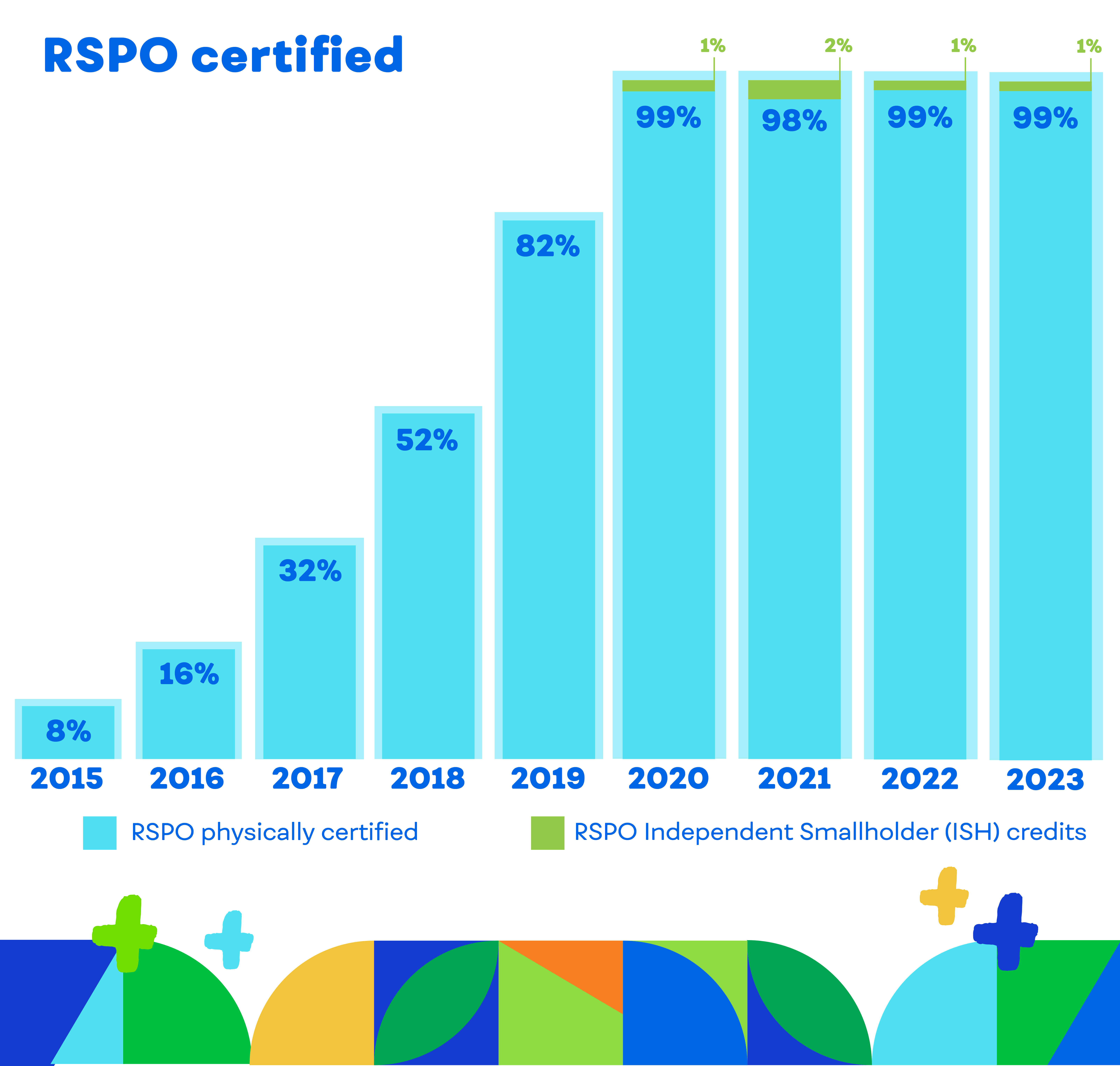
Supplier capabilities
Each year, we strive to evaluate our direct suppliers to assess their performance in their own operations and supply chain and encourage supplier progress towards sustainable palm production. The overall performance on the supplier scorecards has increased from 36% in 2017, when PepsiCo launched the scorecard, to 62% in 2019 — following the integration of IRF data into the scorecard in the 2019 supplementary baseline — and most recently to 77% in the 2023 reporting cycle. In 2023, we engaged direct suppliers representing more than 99% of our 2023 volumes, and they scored an average of 11.6 points out of 15 total possible. Through the implementation of the scorecard and engagement with our suppliers, we continue to observe improvement across the scorecard criteria in 2023.
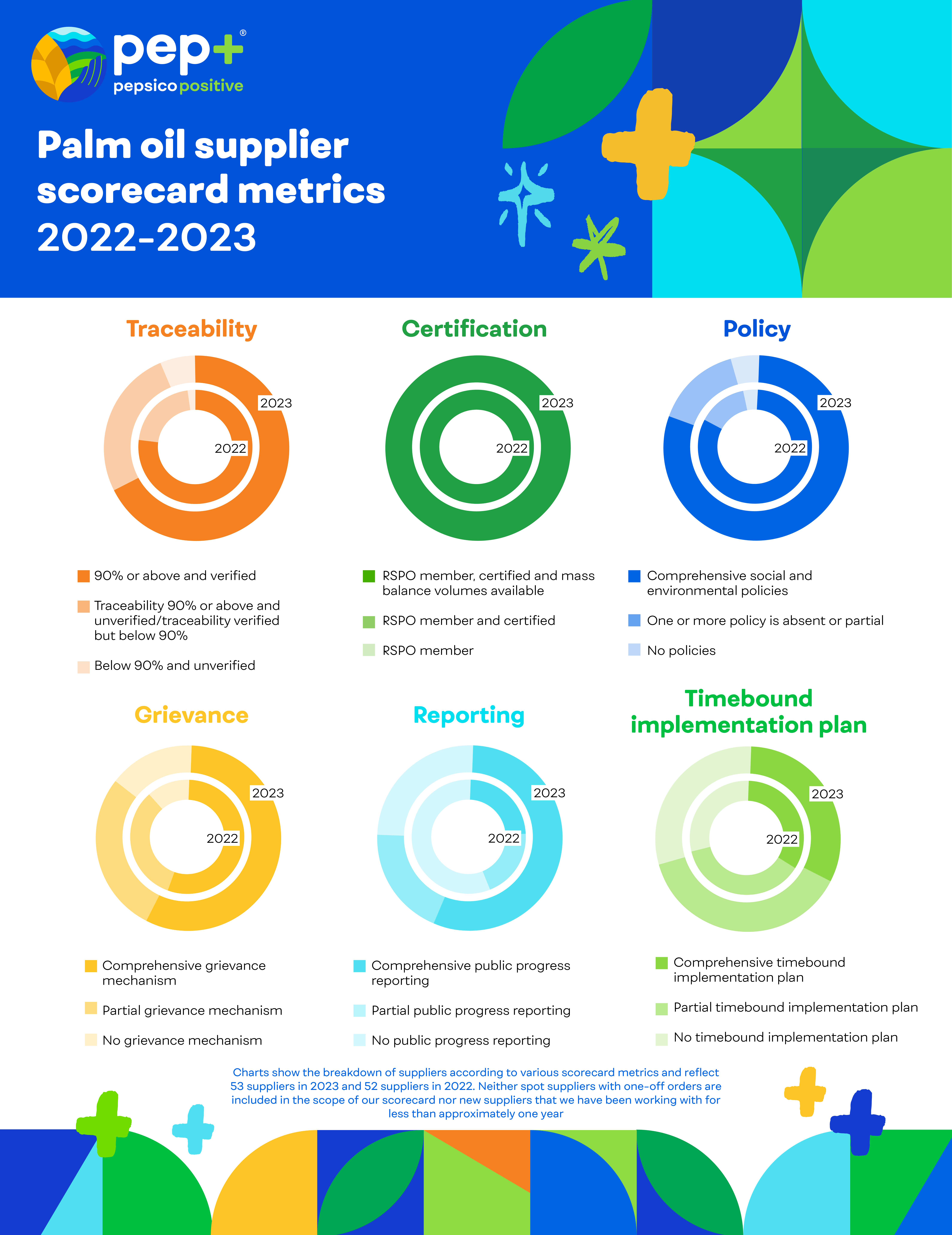
Utilizing the information from the scorecards, we were able to continue our engagement with suppliers and support capability building to help improve practices. In 2023, we continued to deliver this through a variety of engagement methods, including one-on-one sessions with subject matter experts and live webinars, with a focus on policies and timebound plans and the NDPE IRF. To further support capacity building of our suppliers, PepsiCo established a digital library of resources with supporting documents.
Higher performing suppliers (in the top 25%) were approached to partner with us on industry leading protocols and practices.
Sector transformation towards 100% NDPE
Supplier progress towards NDPE
Working with our direct suppliers, we were able to create a baseline of current performance in our supply chain. For 2023, 87% of our Tier 1 suppliers5 were able to provide us with the full profiles for deforestation and peat for the volumes that they source to us. Suppliers who did not share profiles (or shared incomplete profiles) represent less than 1% of our 2023 volumes purchased.
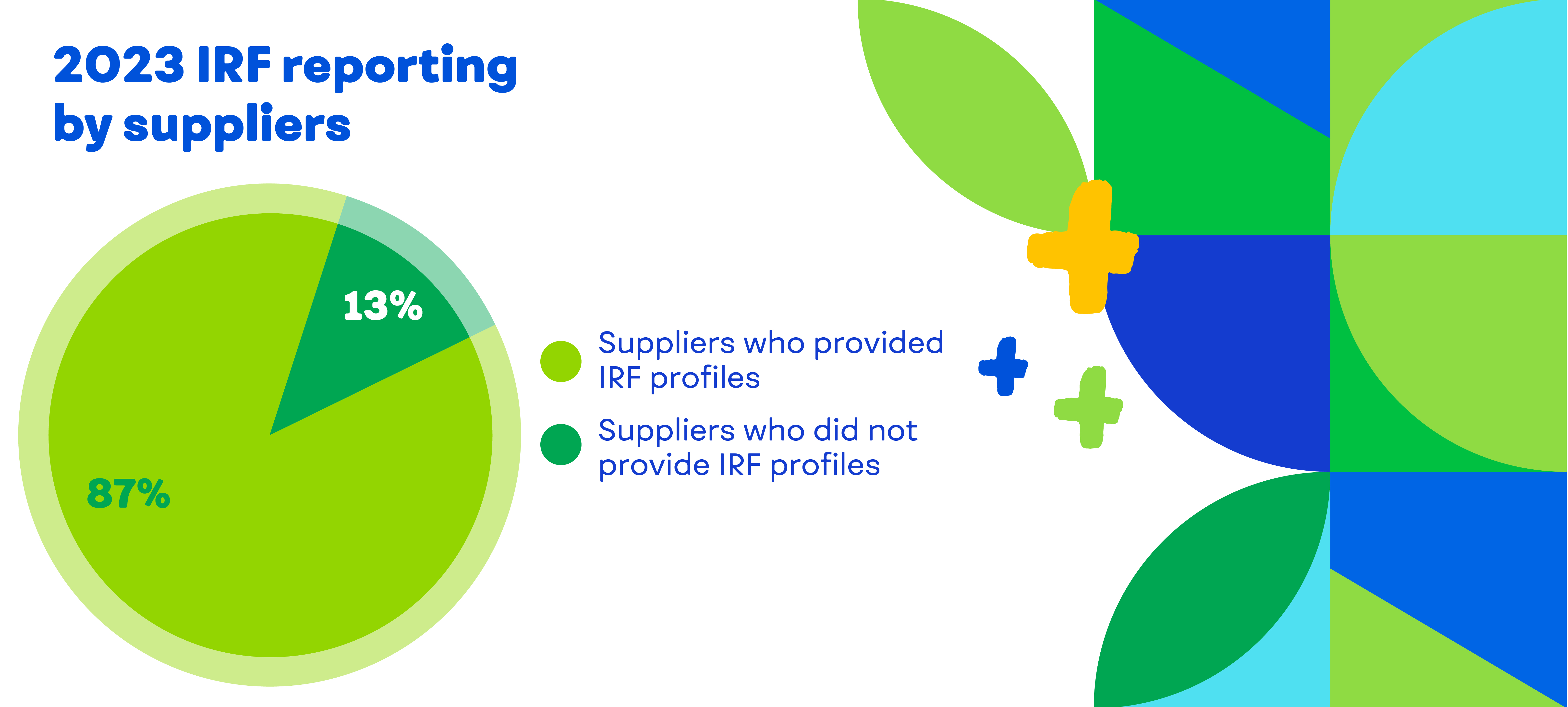
These profiles show a range of performance across the many hundreds of mills in our supply base. They provide information for us and our suppliers to identify how and where to provide support and guidance to mills and other stakeholders as they work to improve their performance against the framework.
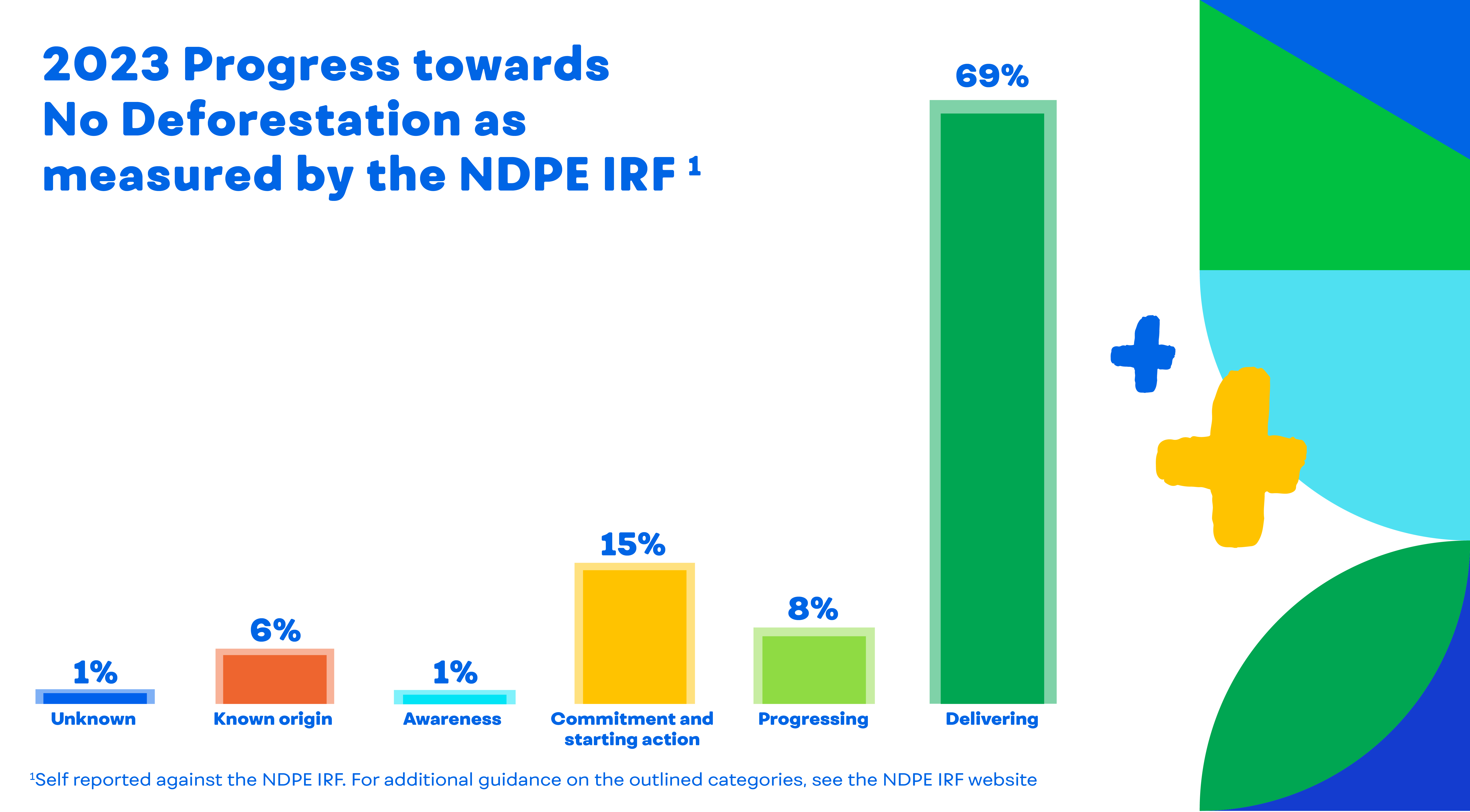
We will continue to work with our direct suppliers in an effort to help ensure they have a system in place to report deforestation and peat profiles. At the end of 2023, 69% of our palm oil suppliers self-reported as NDPE delivering. For those suppliers that were not able to meet this deadline, we are now reviewing options including capacity building, improved reporting support and switching suppliers.
Priorities for the NDPE IRF Active Working Group (Working Group) include how to engage mills that score in the lower sections of the framework and how to include smallholder volumes. The Working Group engaged stakeholders including NGOs to establish a principle of inclusion and support for these mills, rather than exclusion, providing that progress is being made. In 2023, good progress was made on development of the methodology, and there was a corresponding increase in global uptake of the IRF as a reporting tool. In 2023, the Working Group continued to work on the methodology, including improvements to support inclusion of smallholders and to ensure the “delivering” category is aligned to global best practice. The group will also seek to develop an improved approach to measuring social delivery.
The Working Group is also collaborating on shared issues with other workstreams in the Palm Oil Collaboration Group (POCG), including the Production and Protection Beyond Concessions (PPBC), Social Issues Working Group (SIWG) and Independent Verification Working Group (IVWG). See Palm oil partnerships and engagement for more information on the POCG working groups.
Engaging our suppliers on the NDPE IRF
To reflect the framework’s importance and support the objectives set out in our Palm Oil Strategy, PepsiCo has integrated the IRF into our supplier scorecard process (see supplier capabilities for more information on our supplier scorecards). Reporting and performance against the NDPE IRF now make up half of the total supplier score, encouraging ongoing improvement against the IRF and helping to guide how we support suppliers towards delivering their and our NDPE ambitions.
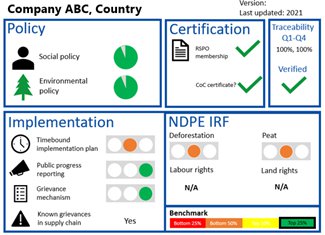
New PepsiCo scorecard with NDPE IRF
Thriving communities and ecosystems
In 2023, we continued work in key palm-producing landscapes in Indonesia and Mexico. In Indonesia, as a founding member of the Siak Pelalawan Landscape Program (SPLP), PepsiCo is working with other stakeholders in an effort to ensure smallholders in Riau are supported. In 2023, we contributed to supporting almost 40 villages on best practices with an eye towards strengthening livelihoods. This included training approximately 3,500 people on best agricultural practices and supporting over 500 people in getting access to incentives through improved knowledge on the need for business permits and land titles. In Aceh Tamiang, we completed the first phase of a project with The Sustainable Trade Initiative and local grower Mopoli Raya designed to support improved productivity and sustainability of smallholders. The project was launched in December 2019 and successfully saw the first RSPO certified group of independent smallholder in the province of Aceh in 2023.
In Mexico, we continued to support the sharing of knowledge with growers and workers by participating in a series of demonstration farm days. We also continued our work with Agrovita, where we are working to improve the livelihoods of palm oil producers in southern Mexico via increased oil palm productivity through regenerative farming practices, and farmers receive higher premiums for RSPO-certified palm oil.
For more detail on our work to support palm oil farming communities and the ecosystems we all rely on, see Palm oil partnerships and engagement.
Transparency and accountability
Traceability to mills
We continue to strive towards 100% traceability to the mill in our supply chain and to ensure high standards of traceability reporting. At the end of 2023, our suppliers reported approximately 98% of our palm oil volumes were traceable to the mill level. Given the complexity of the supply chain, the availability of data from direct suppliers in some of our markets and shifts in market year-over-year, we anticipate maintaining high levels of traceability but falling slightly short of our ambition to achieve full traceability, a component of our 2025 deforestation-free ambition. We will continue to work with our suppliers to close the gap and continue to strive for 100% traceability.
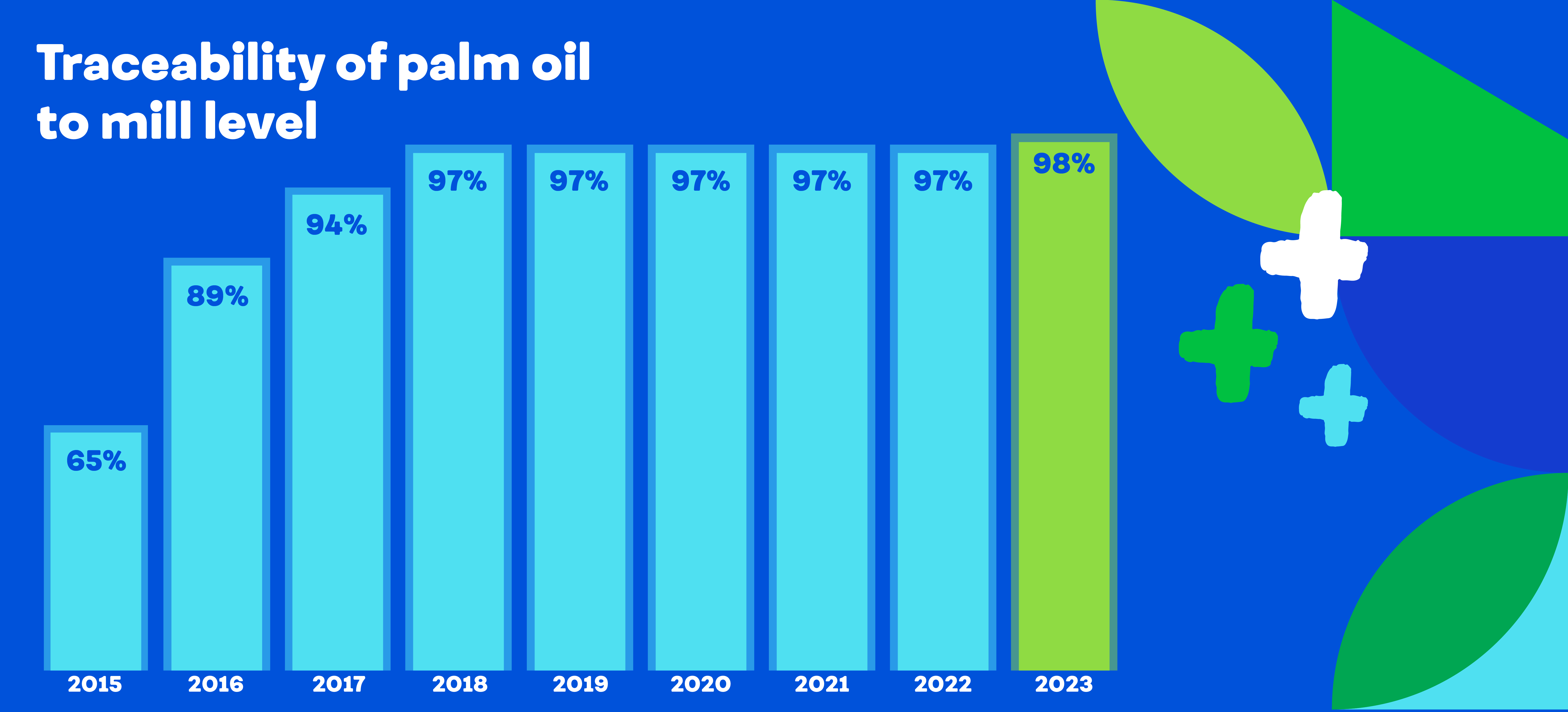
In 2024, we launched a partnership with Satelligence, a satellite monitoring platform, to help improve our capabilities to monitor deforestation events, detect and respond to early alerts and verify origins as deforestation free in our palm oil (global coverage), sugar (Mexico) and cocoa (Brazil, Mexico) supply chains.
Independent verification
We made progress towards developing tools for independent verification through our work within the IVWG, one of the workstreams of the POCG. Alongside Unilever, PepsiCo co-convenes the group, which is focused on determining approaches to independent verification for progress on deforestation, land rights and labor rights. The group has created functional working groups with defined scopes and frameworks for action. These groups are linked to existing initiatives, including the social issues aspect of the IRF, the CGF Palm Oil roadmap and the IRF data verification protocol. In 2023, the group developed a draft framework for independent verification of deforestation, as well as progress on the requirements for verification of labor and land rights claims. In 2024, the Working Group piloted an independent verification tool to understand application in the field, and to provide insights for future implementation.
Grievance management and remedy
Through our agricultural grievance mechanism, we received 30 grievances between 2022 and 2023, with most concerning palm oil production in Southeast Asia and a combination of environmental and social issues (e.g., deforestation, forced labor, land rights). We have engaged and are continuing to engage with our suppliers and other stakeholders to help resolve open grievances through corrective action plans and leverage our suspension process where corrective actions are not taken or are insufficient. By the end of 2023, 32 mills in our supply chain were linked or potentially linked to deforestation and peat grievances and are undergoing suspension, as outlined by our Agricultural Supply Chain Grievance Mechanism.
Strategic partnerships
Stakeholder engagement
We meet directly with stakeholders on a frequent basis and welcome the opportunity to listen to their concerns, receive input and advice about our program and explain our approach to supporting the development of a sustainable palm industry. We have developed a dedicated, cross-functional global team with deep expertise that aims to execute our strategy and drive progress toward our objectives.
External collaboration
PepsiCo also engages regularly with NGOs whose missions range from environmental conservation to protection of human rights. Among the issues previously raised were:
- An updated approach to sustainable palm oil that recognizes the need to adopt a forest-positive mindset. We launched our new Palm Oil Strategy in April 2021 to reflect our vision of sustainable palm oil in our own supply chain and across the industry.
- Closer collaboration with peers to maximize our impact. PepsiCo is a leading member of the CGF Forest Positive Coalition and the POCG, both of which seek to do this.
- The scope of our policy and the request to apply our policy to companies in our supply chain at the company-wide level. Our updated palm oil policy applies to companies at the company-wide level.
- The need for greater confidence in the independent verification that standards are being met throughout the palm oil supply chain. PepsiCo co-led the development of a workshop with industry and civil society at the 17th Annual Roundtable Conference on Sustainable Palm Oil (RT17) to discuss the role of independent verification and plans to convene and participate in follow-up meetings.
- Greater clarity and visibility on our agricultural grievance process. These views have been incorporated into the review of our grievance process, led by an expert external organization.
For more information on our partnerships and actions, see Palm oil partnerships and engagement.
What’s next?
- Sustainable palm oil sourcing: We plan to continue to focus on supporting RSPO uptake and effectiveness through continued sourcing of 100% RSPO certified palm, with at least 95% being physically-certified and the balance comprised of ISH credits.
- Sector transformation towards 100% NDPE: We continue to work with suppliers with the objective that 100% of our direct suppliers have internal systems in place to measure, manage and report NDPE progress via verified IRF profiles and action plans. From 2024, new suppliers must have IRF profiles and actions in place, and we will assess supplier progress toward no-exploitation commitments.
- Thriving communities and ecosystems: We continue to expand our investments to include new landscape projects that support conservation, restoration, community development, smallholder inclusion, responsible production practices and issues-based programs that tackle specific challenges.
- Transparency and accountability: We aim to disclose information on actions taken to help address non-compliances and grievances directly linked to PepsiCo’s palm oil supply chain, as managed through our Agricultural Supply Chain Grievance Process, while respecting the confidentiality of affected parties.
- Future plans to support smallholders: we plan to continue to build on the work we are undertaking to support smallholders as we view smallholder inclusion as an important component of our Global Policy on Sustainable Palm Oil and implementation plan. In 2024 and beyond, we plan to:
- Continue to support smallholder programs in Indonesia and Mexico, including adding programs where appropriate.
- Work together with multiple stakeholders in several landscapes to support the inclusion of non-certified smallholders into responsible supply chains.
- Continue to support smallholder programs in Indonesia and Mexico, including adding programs where appropriate.
1In 2023, nearly 99% of palm oil by volume was physically-certified RSPO Mass Balance. The remaining 1% is covered by Independent Smallholder Credits
2For grower-sourced crops, sustainable sourcing refers to meeting the independently verified environmental, social and economic principles of PepsiCo’s Sustainable Farming Program (SFP). For supplier-sourced crops, sustainable sourcing is achieved through a third-party standard that has been benchmarked as equivalent to the SFP or, in limited regions, a continuous improvement program addressing the main environmental and social risks with growing the relevant crop. PepsiCo considers its sustainably sourced volumes to be those that are certified by third parties, such as Roundtable on Sustainable Palm Oil (RSPO) - certified palm oil and Bonsucro-certified (or equivalent) cane sugar, either through physically certified volumes or the purchase of credits. Certain legal and systemic barriers will challenge us as we strive toward our goal of sustainably sourcing 100% of our key ingredients. For example, certain jurisdictions prohibit farmers from holding legal rights to the land they farm (a component of our sustainable sourcing definition). Our sustainable sourcing goal applies to areas where PepsiCo has purchasing control and excludes joint ventures, franchises, co-manufacturers and co-packers and other third parties over which we do not hold purchasing control
3UNOPS. (2020). Restoring Indonesian peatlands, protecting our planet
4World Resources Institute. (2021). How much forest was lost in 2020?
5Tier 1 suppliers are the direct suppliers of PepsiCo
Related topics
Agriculture, Climate change, Deforestation, Human rights, Land rights, Sustainable sourcing
Downloads
Disclosures
Last updated
February 24, 2025